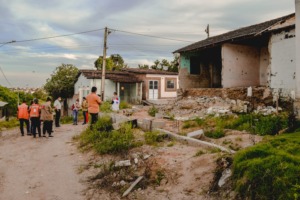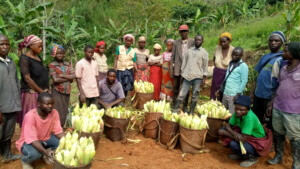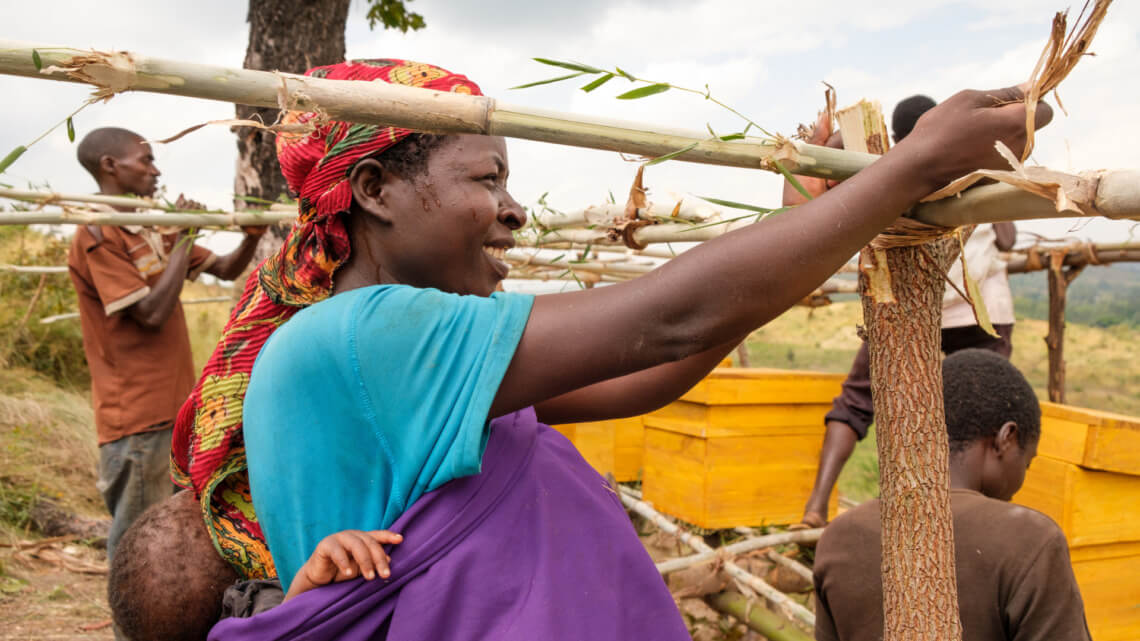We practice the “nexus” approach, which consists of combining these different aspects (nexus = connection of several elements). This is possible thanks to our international network and the Caritas structures that are present before, during, and after the crises in the concerned regions. There are hardly any countries in which Caritas is not represented. At the local and national level, our network extends from parishes to dioceses. At the international level, the Caritas network comprises 162 organizations, working together in 200 countries and regions.
Here are 7 questions and answers to understand everything about emergency aid, development, and Caritas action.
WHAT IS EMERGENCY AID?
Also called humanitarian aid or aid in crisis situations, emergency aid aims to save lives, prevent or alleviate suffering, and preserve the dignity of people affected by exceptional crises such as floods, famines, earthquakes, or terrorist attacks. Emergency aid is also provided to victims of long-term crises or wars. This is the case, for example, for displaced persons in eastern DR Congo or Syrian refugees in Lebanon.
HOW DOES CARITAS ORGANIZE EMERGENCY AID?
Jean-Yves Terlinden, Emergency Relief Coordinator, explains: “When a crisis occurs, the international Caritas network coordination center in Rome receives, validates, and shares information about the needs of the affected population. The Caritas organization in the concerned country then draws up a response plan and the network members coordinate to implement it. This plan usually includes several phases: short-term emergency aid, followed by medium- and long-term reconstruction support.
 With Caritas Brazil and Caritas Switzerland and with the support of the European Union, Caritas International is supporting flood victims in the state of Bahia, Brazil: we are providing them with hygiene and cleaning kits, money and shelter. – Caritas Brazil
With Caritas Brazil and Caritas Switzerland and with the support of the European Union, Caritas International is supporting flood victims in the state of Bahia, Brazil: we are providing them with hygiene and cleaning kits, money and shelter. – Caritas Brazil
“Caritas International independently decides whether and how it will become involved in the project: by providing financial means, relief materials and/or back-up personnel. In practice, this often means providing shelter for people who have lost their homes, medical care, food, clean water and sanitation, and protection for the most vulnerable.”
WHAT IS DEVELOPMENT COOPERATION?
Emergency aid is organized to respond to urgent needs.
Development cooperation, on the other hand, addresses the underlying causes of poverty and crises in the medium and long term.
Through its structural development support programs, Caritas International strives to improve the living conditions of the most vulnerable and marginalized populations in a sustainable way. In both cases, we work with networks and actors at the local, national, and international levels.
Our structural programs focus on four main challenges: growing inequality, climate crisis, demographic change, and migration and urbanization.
ARE EMERGENCY AID AND DEVELOPMENT COOPERATION RELATED?
Jean-Yves: “Emergency aid and development cooperation are not two completely independent activities. On the contrary, one does not go without the other. When we provide aid during a crisis and during the reconstruction phase, we are already thinking in the longer term. In Uganda, for example, we support refugees from eastern DR Congo with food aid, but not only that: young people are given the opportunity to receive training that will enable them to support themselves later on.
In the same way, our development programs include a component dedicated to disaster risk reduction in dangerous areas. In Kirundo, Burundi, for example, we are anticipating the risk of crop failure due to lack of water: we are encouraging the use of drought-resistant species, promoting soil mulching techniques, fighting deforestation, and reforesting hillsides so that the soil can better absorb water.”

Poverty greatly increases the risk of disaster, while significantly reducing the opportunities for recovery. People living in poverty have no savings. If they have to buy food because the harvest was not good, they have no choice but to sell their animals and tools; they are sometimes forced to eat their seeds. A vicious cycle is established, which leads to more and more poverty. This is why Caritas International never considers emergency aid without development cooperation and vice versa.
>> ALSO READ: Risk reduction & disaster prevention
HOW DOES CARITAS INTERNATIONAL BRING ABOUT CHANGE?
Our emergency aid and development cooperation activities take place in a variety of contexts. The means and time available to us can also vary greatly from one place or time to another. Beyond these differences, Caritas International believes that the way to bring about change must follow the same principles – whether it is emergency aid to help people regain control of their lives, or international cooperation to create better living conditions. We are guided by our Catholic identity, by our many years of experience, and by good practices in the sector.
Bernadette Van Raemdonck, head of the International Cooperation Department, sums it up: “Our key words are partnership and local anchoring. The communities concerned and the local Caritas organizations are our privileged partners: it is with them that we co-design and implement our actions. But we also collaborate with other actors in different fields of expertise. We want to enhance the qualities and know-how of all parties involved, strengthen their skills when possible (capacity building & empowerment), and increase the resilience of our target groups. Moving towards gender equality is part of this dynamic.”
 DCaritas International is convinced that humanitarian aid and development go hand in hand and integrates these two aspects in its work as much as possible. In South Kivu, for example, in DR Congo, we organize emergency aid and support the re-launch of agricultural activities for the local population and displaced people. – Ismael Maisha
DCaritas International is convinced that humanitarian aid and development go hand in hand and integrates these two aspects in its work as much as possible. In South Kivu, for example, in DR Congo, we organize emergency aid and support the re-launch of agricultural activities for the local population and displaced people. – Ismael Maisha
“We want to respond in a global way to the problems encountered. We take into account the material needs of the people we accompany, but also the social and psychological aspects of their situation. For Caritas, emergency aid, reconstruction, development, and social cohesion (peacebuilding) go hand in hand. We also pay attention to the links between people, animals, plants, and the environment and to the balance in their interactions (integral ecology). Caritas International ensures that its actions do not have negative side effects and adheres to the principle of ‘do no harm’. This, in a few words, is our guideline for the years to come,” concludes Bernadette.
>>ALSO READ: Climate resilience for rural communities in Burundi
WHERE IS CARITAS INTERNATIONAL ACTIVE ABROAD?
We are mainly active in East, West, and Central Africa and the Middle East. In order to maximize the long-term impact of our programs and to increase the chances of bringing about the desired changes, we work in a limited number of countries. Caritas International draws on its long-standing experience and the Organization for Economic Co-operation and Development’s (OECD) “State of Fragility” report[1] to address problems where they are most pronounced.
In theory, our humanitarian interventions are possible anywhere in the world, but we make choices. Jean-Yves explains: “For example, we avoid launching a large-scale program in a country where we have no experience, such as Guatemala. We prefer to leave it to Caritas organizations that have a strong connection with the country, know the local partners well, and may already have staff on site. An alternative is to financially support the programs of other Caritas organizations or to work in a consortium. This is much more efficient and usually works better.”
WHAT INTERNATIONAL CONVENTIONS GOVERN OUR WORK?
As mentioned above, Caritas International is a member of the international Caritas network, which brings together 162 local organizations around the world. Within this network, we adhere to a number of international frameworks and agreements:
- The 2030 Agenda for Sustainable Development (the United Nations Sustainable Development Goals or SDGs)[1]. Caritas International focuses on the goals of poverty eradication (SDG 1), gender equality (SDG 5), economic growth and decent work (SDG 8), reducing inequality (SDG 10), combating climate change (SDG 13), and peace, access to justice and effective institutions (SDG 16).
- The Sendai Framework for Action on Disaster Risk Reduction (United Nations, 2015)[3]: understand disaster risk (priority 1), invest in disaster risk reduction to build resilience (priority 3), improve preparedness for effective response (priority 4).
- The Paris Agreement on Climate Change (2015)[4], which aims to limit global warming to below 1.5 degrees above pre-industrial levels and achieve a climate-neutral world by the middle of the 21st century.
- The Grand Bargain (2016)[5]: This is a commitment by major donors and humanitarian agencies to increase resources for humanitarian action and improve its efficiency and effectiveness. Caritas International contributes to the commitments regarding greater transparency (commitment 1), more support and funding for local and national actors (2), increased use and coordination of cash-based programs (3), and inclusion of people receiving aid in decisions that affect their lives (6).
- The encyclical letter Laudato Si’ (2015)[6]: in it, Pope Francis calls on all people of goodwill to respect and honor the earth and the weakest people of the planet. The environment and the vulnerable are the first to be impacted by our greed. Justice must be integrated into environmental discussions, to listen to both the clamor of the earth and the clamor of the poor. Caritas International subscribes to this “integral ecology” approach in all its activities, both in Belgium and abroad.
YOU CAN HELP TOO!
Humanitarian disasters claim millions of lives around the world. When a crisis strikes, it is imperative to act quickly and protect the people who survive: to stop starvation, to make clean water available again, to stop the spread of disease. A quick and immediate response is only possible through our Emergency Relief Fund. It allows us to work immediately with the international Caritas network and not have to wait for a fundraising campaign to come to fruition.
Often, the media only shows the first stages of emergency aid. Please know that at Caritas International, our support does not stop there. We work with the people affected to get their lives back on track together, to address the structural causes of poverty and to increase their resilience. None of this would be possible without the financial support of many concerned citizens… and yours!
[1] WMO, Etats de fragilités 2020, March 2021, accessed 11/07/2022.
[2] SDGs, Objectifs de développement durable : transformer notre monde, accessed 11/07/2022.
[3] UN, Cadre d’action de Sendai pour la réduction des risques de catastrophe 2015 – 2030, accessed 11/07/2022.
[4] UN, The Paris Agreement, accessed 11/07/2022.
[5] IASC, The Grand Bargain (Official website), March 2015, accessed 11/07/2022.
[6] Vatican, Encyclical letter Laudato Si’ of the Holy Father Francis on care for our common home, accessed 11/07/2022.










